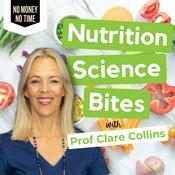In this episode of Nutrition Science Bites, Professor Clare Collins interviews Professor Tracy Burrows, a cancer survivor and expert in nutrition and dietetics, in honor of World Cancer Day. They discuss the importance of nutrition in cancer treatment and survivorship, emphasizing the unique challenges faced by individuals undergoing treatment. Tracy shares her personal experiences with chemotherapy and how nutrition has played a crucial role in managing side effects and maintaining a sense of control during her journey. The conversation highlights the significance of person-centered care and the need for tailored nutrition advice for cancer patients.
Tracy introduces an empowering acronym, "CLAWBACK," which stands for Check-in regularly, Lunchbox Ready, Activity, Water, Best Time of Day, Anything is Better than Nothing, Coffee to Count and Kick in Protein. Each component offers practical strategies for cancer survivors and carers to take charge of their personal nutrition and well-being. The episode concludes with a call to action for listeners to participate in a survey aimed at improving personalized nutrition resources for cancer patients, reinforcing the message that everyone’s experience is unique and deserves attention.
Link to Prof Tracy's checklist to CLAWBACK your nutritional status to protect your appetite, muscle mass, body weight and overall wellbeing during cancer treatment https://nomoneynotime.com.au/hacks-myths-faqs/clawback-your-nutrition-appetite-muscle-mass-weight-during-cancer-treatment
Link to complete Prof Tracy's THRIVE survey for anyone living with, or beyond cancer, or carers of someone living with cancer. Please complete it if you would like to help the team design better resources for nutrition and cancer support https://redcap.link/THRIVEsurvey
For more information on nutrition:-
No Money No Time website https://nomoneynotime.com.au/
Peter MacCallum Cancer Centre CanEAT Pathway for patients and carers https://www.petermac.org/patients-and-carers/information-and-resources/caneatpathway/the-caneat-pathway-for-patients-and-carers
Cancer Council Food and Nutrition website https://www.cancer.org.au/cancer-information/causes-and-prevention/diet-and-exercise/food-and-nutrition
To access the Healthy Eating Quiz: Click on the top right hand 'green button' called 'How healthy is my diet' https://nomoneynotime.com.au/
Want a more Personalised Food, Nutrient Assessment Report? Use our Australian Eating Survey - For a 50% discount enter the 'DietCheck' code at the checkout! Purchase here https://australianeatingsurvey.com.au/
Here's the link to the No Money No Time closed Facebook group (be sure to take the Healthy Eating Quiz first) https://www.facebook.com/groups/386824626838448
Our No Money No Time email:
[email protected] and our Nutrition Science Bites email:
[email protected] Are you in a position to make donation to support our No Money No Time website? Donate here
Keywords: nutrition, cancer, survivorship, person-centered care, World Cancer Day, chemotherapy, healthy eating, dietetics, cancer support, nutrition strategies
Hosted on Acast. See acast.com/privacy for more information.



